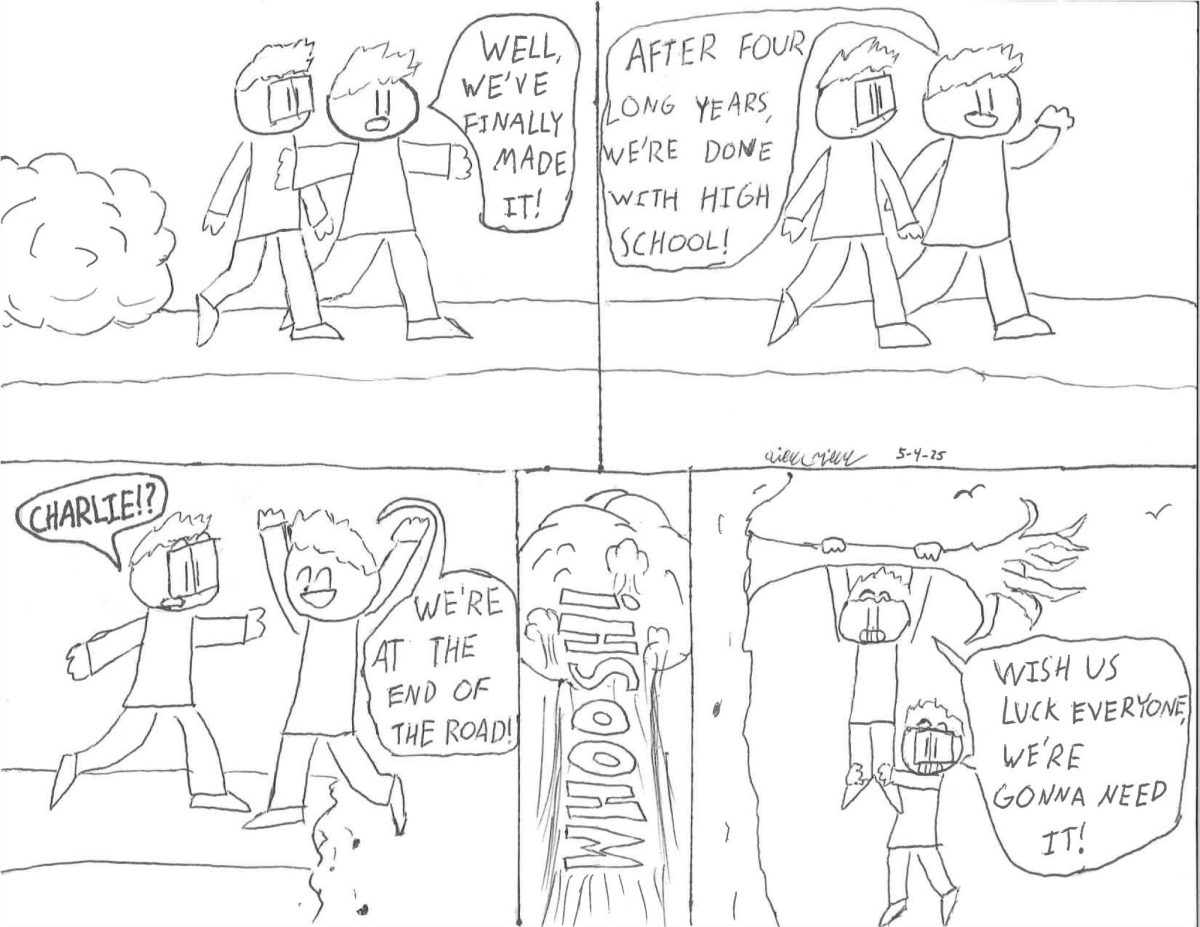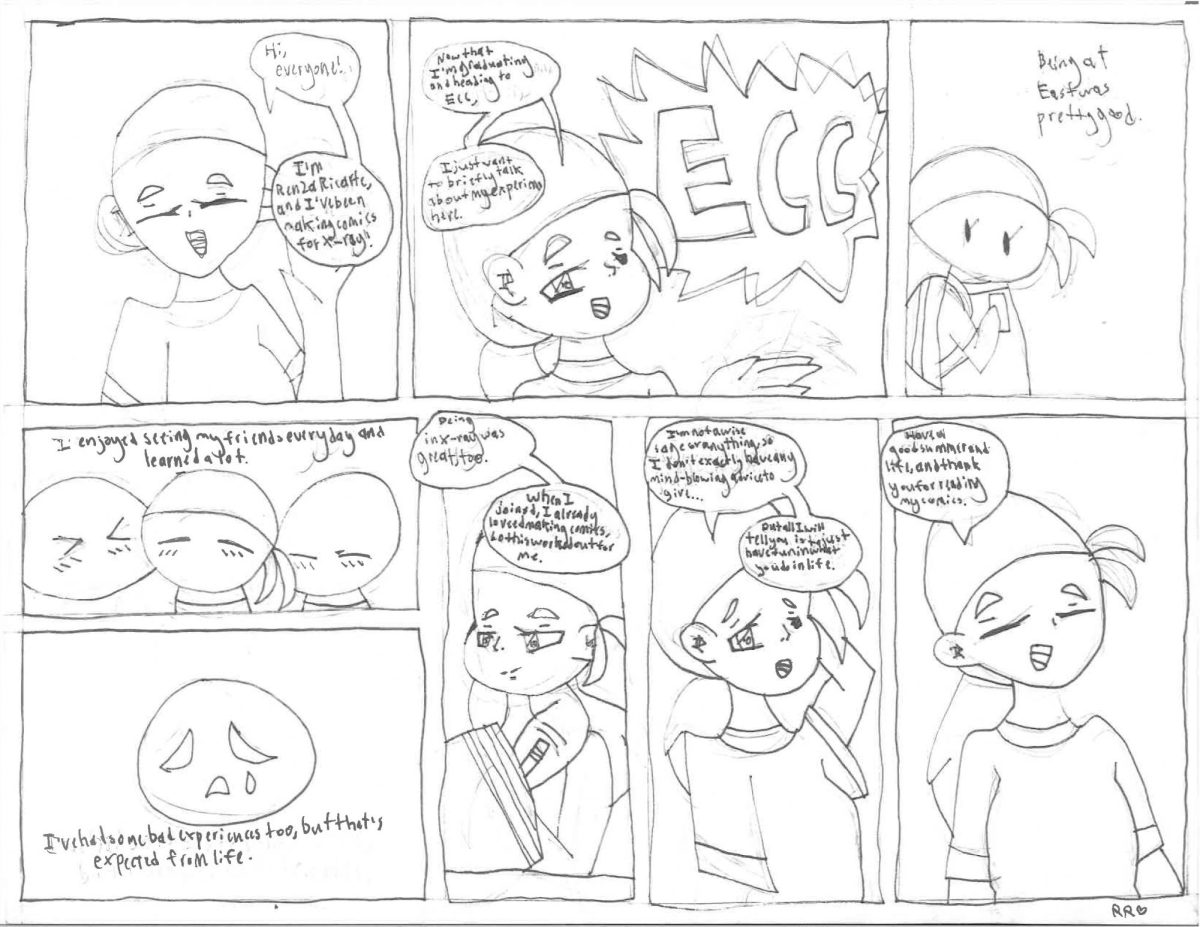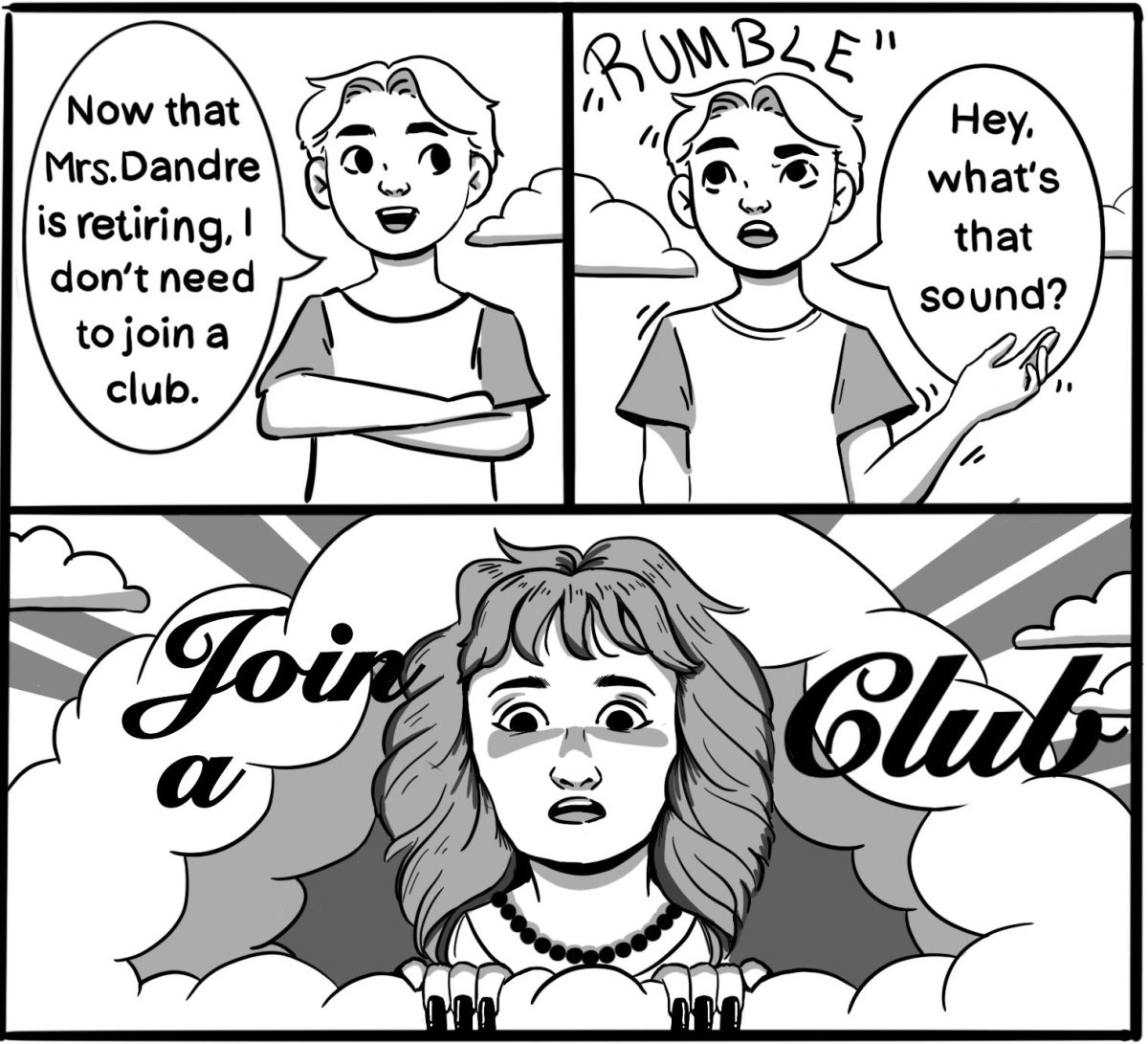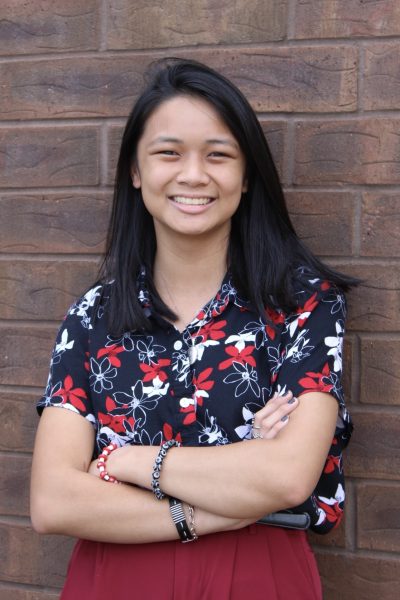
On Nov. 14, 2023, the 2024-2025 course selection season started with the opening up of course requests for students. This came with adding and removing five courses from the Course Offerings Book. The courses added included AP Precalculus, AP Computer Science Principles and College Preparatory English. The courses removed included British Literature Honors and Advanced Applications of Technology.
The courses added were in line with D303’s goal to continuously provide students with opportunities for college and career readiness. AP Precalculus aims to provide precalculus students with a rigorous AP course to prepare them for an AP Calculus class. AP Computer Science Principles was added in response to the current exploding career field in coding in order to provide students with additional rigorous courses in the field. College Preparatory English is a way to provide students who may struggle with English an opportunity to prepare for an english course in college..
The courses removed were decided on after pulling five years worth of data about student requests for the courses mentioned. Oftentimes, students chose different English 12 and CTE (Career and Technical Education) courses than British Literature Honors and Advanced Applications of Technology respectively. This led to both courses having significantly diminished numbers that left both without enrollment for the last several years.
It can also be noted that while not directly discussed at D303’s board meeting, ICB (Integrated Chemistry and Biology) will also no longer be running. While the current cycle of students will finish ICB II next year, the course will no longer be offered to incoming freshmen. Due to state law implementing Honors Biology into the Infinity program, the student pool for ICB was significantly cut. In the best interests of students, it was decided that ICB would no longer run.
Behind the Scenes of STCE’s Course Offerings

How are these decisions made? How does the course offerings system work at STCE? To find out, X-Ray staff interviewed Matthew Jeffrey, the Assistant Principal of Instructional Programs here at East.
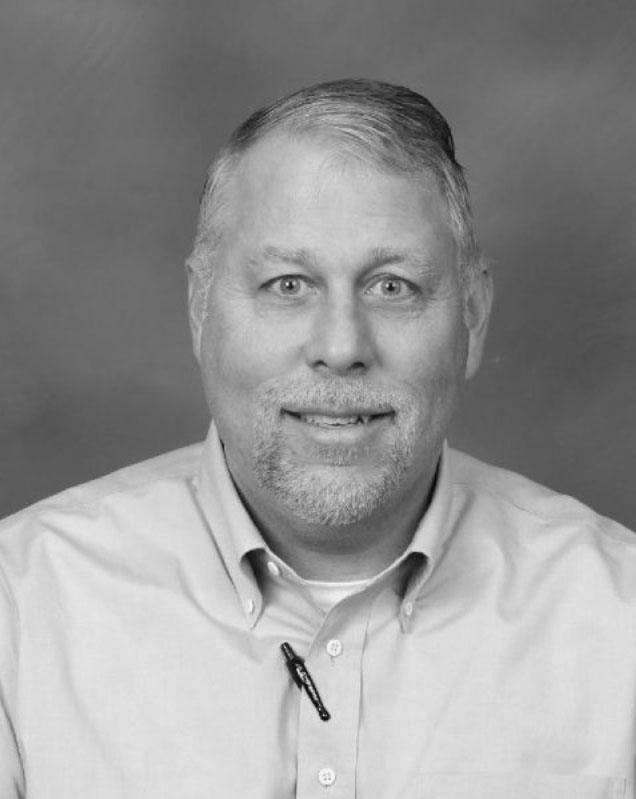
Jeffrey leads the process of coordinating courses at East, which requires collaborative efforts with both East and North staff to make sure courses align as much as possible across the river. Together, they determine which courses to run each school year based on student interest and course pathway considerations.
All student requests are broken up into sections to teach, with the average class size this year being around 25 students. From there, sections are organized into a master schedule, avoiding as much conflict as possible.
This work is aided by the implementation of department chairs in place of lead teachers. In theory, this provides teachers who are content experts in their department with greater leadership and responsibility to be more involved in curriculum and evaluation decisions. They not only help to give feedback on the master schedule as it pertains to their department, but also partake in curriculum decisions and prepare assessments.
An additional consideration when deciding course offerings is state law. The Illinois State Board of Education (ISBE) puts together what the requirements are, and the D303 school board adopts those and gives further direction to schools on what these look like.
One of the most pertinent of these includes the Postsecondary and Workforce Readiness Act, which, among many other things, requires high schools to implement course pathways for students in order to better prepare them for postsecondary education and careers. These course pathways cluster courses together so students can put together a “course sequence” based on what their interests are and what they want to do post-high school.
At the end of each pathway is a “capstone” class that either provides the student with college credit as with an AP or dual credit class, or actual workforce certification such as the ASE credentials achieved at the end of East’s Autos pathway. These pathways help to provide students with tangible skill sets to pursue whatever college and/or career path they choose and ultimately will continue to affect our course offerings here at East in the future.
A large part of this career-focused approach is trying to predict what the evolving careers will be for our generation and providing classes to suit those needs. In recent years, much more interest has been shown in coding and engineering careers. Thus, the school has responded by providing additional CTE and PLTW courses to suit these needs.
However, Jeffrey stressed the importance of achieving a balance of offering courses for students who do know what they want to do after high school and students who don’t. “The analogy I have is, our high school should be like a really good liberal arts college,” said Jeffrey. “We want our school to be one in which kids can have exposure to a wide variety of subjects and contents so that as they get to their sophomore, junior, senior year, they can narrow their focus based on their interest and what they want to do post-high school.”
Through providing both rigorous course options while having an extremely deep course offerings book, Jeffrey believes that STCE has been effective at achieving this balance. “I think we do a really good job of having a number of course offerings to be able to have kids take high-interest classes that are going to help them get to where they want to go beyond graduation. And I think that’s really important.”
Courses Losing Interest

Although Jeffrey was able to speak on the process of course selection at East, he noted that he may not have the experience to speak on the longstanding history of courses at East, as he only started his position on October 31, 2022. To dive deeper into the history of course interest at East, a survey was sent out to teachers to gather data on what courses at East may potentially be losing interest.
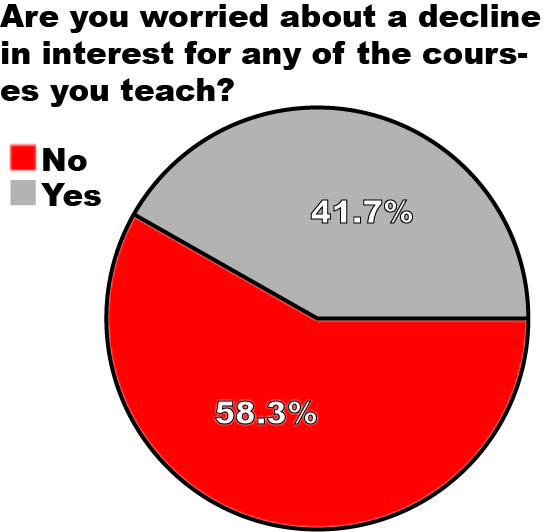
Out of the 24 responses, 41.7% of teachers reported a decline in interest in at least one of the courses they teach. Comparing departments, the social studies department was especially concerned with five out of seven (71%) teachers reporting a decline in interest. Overall, courses in the humanities were reported far more than STEM courses. The courses specified include business courses/INCubator, The Legal System, Astronomy & Oceanography, AP science courses, Sociology, Theater & Stagecraft, AP Literature (AP Lit), Fantasy/Sci-Fi, AP Human Geography (twice) and social studies electives in general.
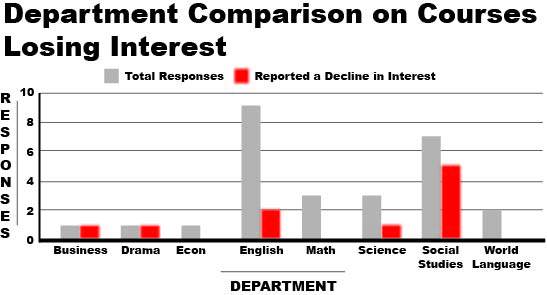
One thing that should be pointed out is that school enrollment has also generally gone down. Over the past few years, East’s enrollment has steadily declined from around 2,400 to 1,900, which could be the ultimate cause of a drop in numbers for certain courses.
Nonetheless, X-Ray staff interviewed six teachers to investigate why these courses may reportedly be losing interest.
Course-Related Problems

Sometimes there’s no underlying root cause for a course losing interest other than things about the course itself. This was most evident when talking with social studies teacher Andrew Johnson, who expanded his thoughts on why he thinks The Legal System may be losing interest. Three years ago, the course had around three sections that totaled around 75 students. This year, Johnson says that he only teaches one section of the course with around 25 students in it.

The Legal System, a one-semester course that discusses law and the different elements of the court system, used to be called Criminal Justice, which discussed more topics about police work and crime.
“Why do people commit crime? What makes something a crime? What are different kinds of crime? How do the police investigate crime?” were some questions Johnson presented when describing the course. This curriculum seemed to attract more students who may have been interested in the topic of individual rights in general.
However, when the Fox Valley Career Center started running a similar course taught by an actual police officer in a much more hands-on fashion, that part of East’s course was removed and the course was turned into The Legal System.
One other change to the course was the bus shortage’s effect on field trips the class would typically take to watch actual trials at the Kane County Judicial Center. Among other things, students were able to see a murder trial, an attempted murder case, domestic battery cases, etc.
“How much cooler could that be?” said Johnson. “You could see the application of what we’re learning, and now not being able to do that—I think it’s had an effect.”
This concept could also be seen when talking to social studies teacher Mary Kate Lesmann about Sociology. Currently, she teaches two sections with 18 and 19 students each, which is well under the average class size. She said that many students may feel intimidated by the course description and the controversial topics the class ends up discussing.
“It’s true, we have been having those ‘harder’ conversations in Sociology. I think it’s a really good opportunity to raise your awareness on controversial topics,” said Lesmann. However, she said that oftentimes, it ends up being a good experience for students in the long run.“The coolest thing about sociology is seeing the strange in the familiar and seeing the general in the particular. […] “It helps you see yourself in the context of the society you live in, and I think that can be very liberating for a lot of people.”
Other than the courses’ curriculums, its comparison to other classes may affect its interest. Class competition often causes certain courses to lose interest when students pick one course over others, as seen with both of the courses being removed for the upcoming school year.
Similarly, the course’s ability to fit into a schedule also oftentimes affects its interest, as seen with many one-semester electives and AP science classes that take up a period and a half. With these courses, some students may shy away from them or be forced to choose between courses because of how awkward of a fit they may be in their schedules.
And sometimes lack of interest in a course just boils down to the teacher. “[Sometimes it’s] the reputation of the teachers teaching those courses,” said Jeffrey. “[It’s] whether or not they’ve taken a class with that teacher in the past and had a good experience and if they want to take another class with [them].”

A course that’s been affected by a little bit of all of this is AP Lit, as noted by English teacher Jonathan Kittl. At the course’s peak in 2017, there were around four sections of the class totaling to nearly 100 students. However, after COVID, interest has significantly dropped off to two sections in the 2023-2024 school year.
The course competes with English 101 in terms of providing college credit for English 12 students. Kittl also acknowledges that without Dr. Reed teaching the class, many people may not choose to take it anymore. Reed’s retirement was also a contributing factor to the removal of BritLit, according to Jeffrey.
In terms of the AP Lit curriculum, AP states that texts must cover the time period from 1500 to today, which may intimidate people who are scared of harder texts. “I think a lot of people get tweaked up by Shakespeare and some of that harder stuff,” said Kittl. “They see that language and they’re like, ‘Nah, no thanks.’ So it’s an instant sign-off.”
So, how do you regain interest in a course when the issue may just be the course itself? Kittl is trying his best to make AP Lit’s curriculum appealing to students. “I have tried to, as best as possible, make the literature as diverse as possible,” he said. “I try to give choice where possible, but there’s also stuff that we have to do at some point.”
Johnson and Lesmann both acknowledged the importance of simply advertising the class. For many of the smaller social studies electives that don’t end up getting advertised much, if at all, a little word of mouth goes a long way.
A College and Career-Oriented Culture


As mentioned previously, a lot of course offerings at East are based on college and career readiness. However, an increasing push for this goal sometimes seems to push other courses aside. A large aspect of this was consistently seen when asking teachers how STEM careers are pushed versus careers in the humanities.
“People devalue humanities as a valid career,” said Lesmann. “[People] don’t see [Sociology] as valid vocational training because all of our schooling is so focused on, ‘Well, what are you going to do with it after?’ It all needs to be meaningful in some way instead of just meaningful to your own personal development.”
Science department chair Matthew Bulman agreed with this sentiment on a national level. “I do think there’s a big push in STEM just nationally that the United States is somehow behind everyone else, and we need to have better technology and be the best at all this stuff on here. Whereas, we don’t need to be the best in humanities.”
Kittl also applied this notion to AP Lit. Many students don’t see a class such as AP Lit as beneficial to their career as much as STEM courses simply because STEM careers make more money. “A lot of times, we’re like an obstacle for people to overcome as opposed to a way of life,” he said.
Despite this, Jeffrey believes that East does a good job at balancing both STEM and humanities in terms of course offerings, especially in comparison to other schools. “I think that’s one thing that’s kind of set us apart is [that] we’ve not prioritized one over the other, but we’ve always tried to say [that] you can do both and excel in all those areas and not try to define that for our students, but let them figure it out,” he said.
Although, just because a course is offered doesn’t guarantee interest in it, as seen with courses such as Sociology and AP Lit. “We’re [so] career-oriented and college-oriented that people don’t necessarily see the academic value in Sociology,” said Lesmann.
While we haven’t seen an outright push from the school towards taking STEM classes, the mindset of being focused on college and career courses often ends up directing students that way. Students may feel pressured to figure out what they want to do very early on and stick to it throughout their high school career, even if they’re not completely sure. This is a phenomenon that was noticed by many of the teachers interviewed.
Johnson pointed out how the search for a college and career has moved earlier and earlier over time. When he was in high school, he only began thinking about college starting senior year, and even then, it was only local colleges. “I think with everything kind of being moved earlier, it has made students more concerned about, ‘I’ve got to do this because I want to do this when [I grow up],’” he said. “[But] I’m not sure that students have a really good idea about truly what they want to do ‘when they grow up.’”

This idea was exemplified when talking to science teacher Julie Dowling about the electives she teaches, including Astronomy and Oceanography. Both of the courses she teaches have sections with no more than 20 students each, with one section of Astronomy only having 13 students.
Dowling said that electives overall seem to be losing interest, largely due to the increasing number of students feeling pushed towards taking AP courses. She described how, originally, AP courses were designed to be for gifted students or those who had special interests to be able to master a curriculum above a high school level but not be pulled out of school for it. However, now a much larger percentage of students take these higher-level courses, often to boost their GPA.
“I think that students think a measure of their success is their GPA, when in essence, they should be looking to develop skills that transfer across many different career paths,” said Dowling.
With science electives specifically, Dowling noted that for students who already know that they’re going into STEM, they’ll more often than not choose a core course over an elective that they can get honors or AP credit for, so much of that interest pool is lost there.
Because of this, Dowling is a strong advocate for students to use high school as a time to explore what their interests may be instead of constantly striving for higher-level classes to define their success. “Virtually every person I know changed their major when they went to college,” she said. “So let’s give [students] the opportunity to experience before they get there.”
She said that this work starts at home with parents encouraging their children to use their classes to explore their interests rather than pressuring them into taking honors or AP classes. “I think [a solution is] starting at home with the parents understanding that [high school] is a place for exploration, to determine what [students] like and what they’re good at, and then maybe not being quite so focused on class rank and GPA. But it’s easier said than done, you know?”
The Lingering Effects of COVID

 Years after students returned to school, the effects of COVID can still be seen in them. English and Theater teacher Teresa Bundy pointed out the effects the pandemic has had on Theater and Stagecraft. Ever since COVID, numbers have been dwindling for both courses, with only one section of each this year and Stagecraft having to be combined with Actor’s Workshop.
Years after students returned to school, the effects of COVID can still be seen in them. English and Theater teacher Teresa Bundy pointed out the effects the pandemic has had on Theater and Stagecraft. Ever since COVID, numbers have been dwindling for both courses, with only one section of each this year and Stagecraft having to be combined with Actor’s Workshop.
Bundy said that COVID hit the entirety of the performing arts at East hard, including the Music and Theater departments. A trend she’s noticed in the theater department is that many more kids shy away from a performance-based class than they did before COVID and generally have more interest in the Stagecraft class, a trend that was usually the opposite. However, Bundy has now noticed that many more kids are interested in work in which they can be more independent and not have to perform in front of an audience.
When asked if she thought this shift had something to do with our generation, she said she was still trying to figure it out. “Did we lose something along the way where we’ve gotten so used to being behind a screen that we’re shying away from that interpersonal collaborative experience where we’re telling a story in front of an audience?” she asked.
Bulman also expressed concern over COVID stifling students’ confidence when it came to taking on AP courses, specifically AP science classes. AP Chemistry went from three sections to one, AP Biology from four sections to two, and AP Physics tends to lose interest because the lack of an honors option scares people away from the leap to an AP class.
“Anecdotally, speaking with [students], when they register for classes they’re like, ‘Well, I took that one online. I’m not good at it.’ Like that’s kind of the mantra they had,” said Bulman. There seems to be a mindset of students not being confident with any class they took during the pandemic, so they’re scared of challenging themselves with a potential AP course in those subjects.
Unlike Dowling, Bulman believes that electives maintain a fairly high level of interest for this reason. While AP courses look challenging, electives are much less stressful, and there’s less pressure to be perfect in them. “I think post-COVID, a lot of kids realize [that] while school is really important, your stress level and your life in general and having that balance is really important,” he said.
Kittl also talked about the effects of the internet and COVID on AP Lit. “In short, people don’t read fiction [how] they used to,” he said. The rise of the internet and the way we consume media now has given us much easier ways to be told a story. In general, he said the internet has caused us to fundamentally change the way we tend to read. “Everything is picture and video based. […] Internet pages have trained people to not read all the way across the page. We have trained ourselves to read for a gist.”
So how do we rebuild interest for courses after a global pandemic? Bundy said that her old method of simply advertising the courses isn’t really working anymore. “Before COVID, yes, [interest for theater] was building,” she said. “And then COVID happened, and what I was using before doesn’t necessarily seem to be having the same effect.”
Kittl and Bulman both emphasized the importance of changing students’ mindsets when it comes to school and learning. Specifically, there seemed to be a theme of encouraging students to challenge themselves, step out of their comfort zone and not be afraid to try something different.
“There has to be a willingness on students as well to say difference might be challenging, [but] let me give it a whirl,” said Kittl. “ Our reading isn’t going to improve if we keep on reading the same simple stuff over and over.”
Bundy hopes that interest in Theater will come back again with time. To regain interest in AP science courses, Bulman stressed the importance of teacher involvement in building back students’ confidence. Hearing encouragement from an adult may fuel kids who are unsure about themselves to turn around and think that they might actually be alright at something.
“That little piece of belief might be enough to spark [their confidence]. So we can’t just wait. We have to encourage kids,” said Bulman. “It’s really important that we continue to maintain those relationships with kids so that they feel competent and supported. […] But we also have to do it responsibly where we don’t just shove them into random classes and watch them fail. So that’s the balance.”
Course offerings for the 2023-2024 school year will be finalized throughout December 2023 to February 2024. Resources can be found on the Academic Planning page of the D303 website to help students make decisions that will help them accomplish their goals.





